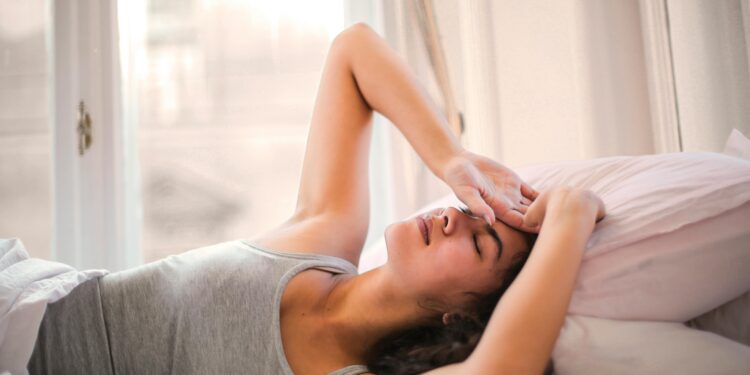Sleeping with Anxiety: Real Women Share Their Stories and Coping Strategies.

Anxiety is more present today than ever. It’s not because anxiety never existed but because we hear about it so much more often through social media. Social media, inherently, is, in fact, one of the main triggers of anxiety. We, as a society, live in a world of comparison. What we don’t have. What we want.
Sleeping with anxiety can cause disruptive sleep and lead to other issues. But to ignore the anxiety is no way to cope, either. Knowing how women use successful coping strategies can be a big part of the puzzle.

How Anxiety Affects Sleep
Understanding you are not alone is one of the more comforting ways to ease anxiety. Many women who experience anxiety near or during sleep find that the following happens to them.
- You may experience trouble falling asleep. Anxiety can seem to heighten or worsen at the idea of trying to fall asleep. Your mind may start to race, and many thoughts may come into play.
- You find yourself waking up in the middle of the night. You may find yourself with shortness of breath or like you are waking up from a bad dream.
- With disruptive sleep, you may find yourself nodding off during the day or being in a total trans-like state. Unmotivated to complete small and big daily tasks.
These are a few of the many ways anxiety can disrupt not only your sleep patterns but also your day-to-day life.
Effective Coping Strategies
Taking control of your anxiety is possible. Many women have implemented these strategies and coping mechanisms to combine the effects of sleep anxiety. Knowing that there are proven methods that work is half the battle.
Deep Breathing Exercises
Deep breathing has been clinically proven to calm our state of mind. This is because it physically can lower our resting heart rate and relax the parasympathetic nervous system. This is often a tool therapists will use to calm patients down. But there are a few different ways to do this.
- 4-7-8 breathing focuses on pattern breathing. Through your nose, you take four seconds of breath in, hold it for seven seconds, and let it out through your mouth for eight seconds.
- Belly breathing is another technique in which you work to expand your stomach like a balloon. This is different from expanding your chest. This helps with getting air into the diaphragm.
- Box breathing mimics the shape of a box. You breathe in for four seconds, hold for four, breathe out for four seconds, and hold again.
These are a few methods that work well both from an emotional state and a physical state.
Dedicated Wind Down Time
What you do with your time before you go to bed can influence your night’s sleep a great deal. There are a lot of triggers that are worth avoiding such as blue light, thrilling TV, and even scrolling on your phone for hours before. This stimulates your brain and gets you thinking when you should be shutting down.
Grabbing warm relaxing tea and taking a hot bath can be a great way to get your body into a relaxed state. Reading a calming book is also a great coping mechanism. Finding what relaxes you as an individual is valuable. This is different from woman to woman.
You Don’t Need Total Silence
Sometimes silence can be anxiety-inducing for some women. This is because you are left alone with your thoughts. This is why many women divert to leaving the TV on and enjoy falling asleep to calming TV. show. But this can actually wake you up later and cause more disruption.
A better alternative is to consider white noise. There are many different options such as a sound machine or simple rain from an app like Spotify or HeadSpace. Another option is to use an app that tells sleep stories and shuts off after some time.
Comfort Creates Ease
A comfortable sleeping space is one of the more important things to think about. when going to bed. A room that creates peace is a room that will ease sleeping anxiety. This means having a dark space with a comfortable bed.
Something that is important is to differentiate your sleeping space from a hang-out space. When our body registers the bedroom as the place we go to sleep, our internal clock helps us relax and go to bed.
Consider something like a chest supporting cuddle pillow that can help the body find restful positions to induce sleeping. Body pillows are a common but popular option for restless sleepers.
Talking Out Loud
Sort of like reading this article, talking about your sleep anxiety keeps it from bottling it in. Many women struggle with sleep anxiety, and finding other women to connect over it can ease isolating feelings. There are different support groups online that can help connect you both in person and over the web.
Coping With Your Anxiety
It’s important to understand that coping with your sleep anxiety doesn’t mean ignoring it or hiding it. Coping means finding effective strategies to manage it while it occurs. The important thing is to remember that nothing is a quick solution. While many of these coping mechanisms can have immediate benefits, it’s not to say that you’ll experience a total of 180.
It takes time and practice to figure out what strategies will work best for you. While much of anxiety is personal, there are commonalities which is why making tweaks to common practices is what can make the difference. It’s also never a bad idea to reach out to a medical professional who can uncover some of these strategies with you.


